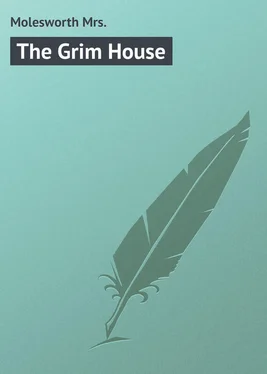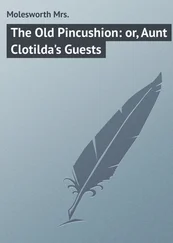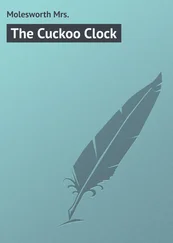Mrs. Molesworth - The Grim House
Здесь есть возможность читать онлайн «Mrs. Molesworth - The Grim House» — ознакомительный отрывок электронной книги совершенно бесплатно, а после прочтения отрывка купить полную версию. В некоторых случаях можно слушать аудио, скачать через торрент в формате fb2 и присутствует краткое содержание. Жанр: foreign_prose, на английском языке. Описание произведения, (предисловие) а так же отзывы посетителей доступны на портале библиотеки ЛибКат.
- Название:The Grim House
- Автор:
- Жанр:
- Год:неизвестен
- ISBN:нет данных
- Рейтинг книги:3 / 5. Голосов: 1
-
Избранное:Добавить в избранное
- Отзывы:
-
Ваша оценка:
- 60
- 1
- 2
- 3
- 4
- 5
The Grim House: краткое содержание, описание и аннотация
Предлагаем к чтению аннотацию, описание, краткое содержание или предисловие (зависит от того, что написал сам автор книги «The Grim House»). Если вы не нашли необходимую информацию о книге — напишите в комментариях, мы постараемся отыскать её.
The Grim House — читать онлайн ознакомительный отрывок
Ниже представлен текст книги, разбитый по страницам. Система сохранения места последней прочитанной страницы, позволяет с удобством читать онлайн бесплатно книгу «The Grim House», без необходимости каждый раз заново искать на чём Вы остановились. Поставьте закладку, и сможете в любой момент перейти на страницу, на которой закончили чтение.
Интервал:
Закладка:
She glanced up. Her face was aglow with excitement, as had been Moore’s. But before she finished her sentence, I saw a look of new expectancy in her eyes, and turning in the same direction, I caught sight of “the father,” as we called him, coming towards us, a letter in his hand also, and a look of inquiry and surprise in his face.
“I think,” he was beginning, as he reached our table. But mother cut him short.
“Yes,” she exclaimed, “you are Mr Wynyard, and I – you must remember me? – I am your Maud’s old friend – Geraldine Terence – now Geraldine Fitzmaurice.”
Chapter Two.
An Embryo Novelist
So it was. A minute or two’s conversation sufficed to establish for each the other’s identity, and to gather up the loosened threads of former acquaintanceship. Worse than loosened indeed, for mother’s face grew sad when Mr Wynyard told her of the death of her old friend, Maud, his wife, which had occurred several years previously.
“I had no idea of it,” she said. “We were so much abroad for some years that many changes may have taken place without my hearing of them. And curiously enough, I have been thinking of her – of your wife, Mr Wynyard, quite specially of late.”
“Don’t you find that that is often the case?” was the reply. “When some old link is about to be renewed, one has a sort of foreshadowing of it. Was it possibly,” he added with a little hesitation, “the involuntary association of some likeness to her in either of my daughters, if you have happened to notice them?”
“Who could help doing so?” said mother in her pretty, gracious manner. “But no,” she went on, “I don’t think it was that! It was even before your arrival here that I was thinking of Maud. When I know them better I shall probably see some likeness in your daughters, but it has not struck me.”
“We think Margaret the most like her,” said the father. “Margaret is Mrs Percy – she and her husband are travelling with us,” and he nodded his head in the direction of his own party. “But your supper will be getting cold – ”
“Come up to our sitting-room afterwards,” said mother, “for our mutual introductions.”
And so they did, and before I fell asleep that night I knew all about them, and had – I may as well confess it once for all – fallen over head and ears in love with the younger girl, Isabel!
Our guesses had been, as has been shown, correct so far as they went. The party of four were wonderfully “untravelled” for even those days. And the charm of novelty greatly enhanced their enjoyment of Weissbad and its neighbourhood. Mr Percy and his wife were thoroughly pleasant young people, and on further acquaintance, mother saw much in the latter that recalled her old friend.
But Isabel it is less easy to describe, and I will scarcely attempt to do so. To some extent her appearance, her very beauty, did her injustice, for it was difficult to believe that it could exist side by side with such complete unaffectedness and simplicity, such entire absence of vanity. She knew – she could not but know – that she was lovely, but she scarcely thought about it, herself in any way occupying a far smaller place in her thought than is the case with many a woman whose small claims on admiration one would imagine likely to beget humility and self-forgetfulness.
And the next day found Moore and myself most willing members of the excursion party to Oberwald. How well I remember it all! My shyness melted away like morning mist in the happy geniality of our companions, above all of Isabel. She was just enough older than I to make it natural that she should take a little the lead in some ways. She had seen more of society than I of course, quietly though they lived at home, and since her sister’s marriage, the fact of being in charge of her father’s house had given her a little air of importance which was quaint and pretty.
Before that pleasant day was over we had compared notes on almost every department of girl-life. I had confided to her my newly awakened feelings of dissatisfaction as to my want of feminine tastes and tendency to “tomboyishness,” and she on her side had told me that she was often afraid of growing too prim or narrow-minded in the well-arranged regularity of her own home-life.
“That was why,” she said, “I was so glad to travel a little. I feel as if I needed to rough it in some ways. Father is too careful of me, too unselfish. I am afraid I have always been a spoilt child, and having no brothers, you see, may make me selfish without knowing it!”
She looked up at me anxiously with her sweet brown eyes. What was it they reminded me of? I had already noticed that her people called her by some peculiar pet name; I had not caught it exactly.
“What is it that your sister and father call you sometimes?” I said. “Is it ‘Ella’?”
Isabel blushed a little.
“ No ,” she said, “it is Zella. Rather a silly name, I am afraid. It came from a fancy of father’s that my eyes were like a gazelle’s.”
“And so they are!” I exclaimed; “that is the look I have seen in them – some dogs have it too! I don’t think it is at all a silly name. Will you let me call you by it sometimes?” for of course under the circumstances there had been no question of anything but “Isabel” and “Regina” between us from the first.
“Of course you may, if you like,” she said. “But – ” and she hesitated.
“But what?” I asked.
Isabel smiled.
“You mustn’t be vexed with me,” she replied, “if I can’t promise to call you ‘Reggie,’ as your brother does. I don’t like it – and Regina is such a pretty name and uncommon too.”
“Mother never calls me anything else,” I said, “but I am afraid I am half a boy. You must civilise me – mother will be eternally grateful to you if you do.”
“I don’t think you need civilising,” said Isabel; “but perhaps in our different ways we may do each other good. I do hope your people will let you come to stay with us when we go home.”
“I should love it of all things,” I said. “I have scarcely ever paid any visits, and I have seen very little of England except quite near our own home. Is it very pretty where you live?”
“Not so much pretty as picturesque,” Isabel replied. “To begin with, it is very, very out of the way; we are six miles from a railway station of any kind, and sixteen from an important one. But papa’s people have lived there for so long, that it doesn’t seem out of the way to us. It is a place that changes very little.”
“Then it is to be hoped that you have some nice and interesting neighbours,” I said. “Near us there are so few young people.”
“And there are not many near Millflowers either,” said Isabel; “at least not within a good long drive. I hope you would not find it dull. There are interesting walks, if you care for wild, rugged scenery. The village itself is quite tiny. There is only one house of any importance besides the vicarage and ours, and that is – no good,” she added, rather abruptly.
“Why not?” I inquired. “Is it uninhabited?”
Isabel hesitated.
“No,” she replied. “The same people have lived in it for a great many years. They were there before father came into possession, on my uncle’s death. But – ” and again she paused.
My curiosity was aroused.
“Do tell me about them,” I said.
“Well, yes, I don’t see why I shouldn’t,” answered Isabel. “Father always tells us not to gossip about the Grim House, but you are sure to notice it when you come, so I may as well prepare you beforehand.”
“The Grim House!” I exclaimed. “Is that the real name? Do tell me all about it. Is it haunted? It must be.”
Читать дальшеИнтервал:
Закладка:
Похожие книги на «The Grim House»
Представляем Вашему вниманию похожие книги на «The Grim House» списком для выбора. Мы отобрали схожую по названию и смыслу литературу в надежде предоставить читателям больше вариантов отыскать новые, интересные, ещё непрочитанные произведения.
Обсуждение, отзывы о книге «The Grim House» и просто собственные мнения читателей. Оставьте ваши комментарии, напишите, что Вы думаете о произведении, его смысле или главных героях. Укажите что конкретно понравилось, а что нет, и почему Вы так считаете.












